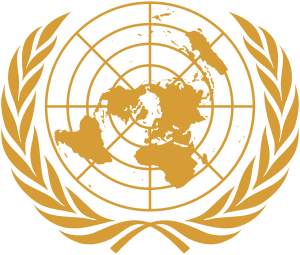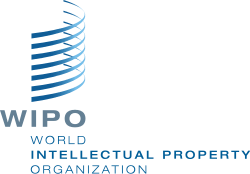World Intellectual Property Organization
The World Intellectual Property Organization (WIPO; French: Organisation mondiale de la propriété intellectuelle (OMPI)) is one of the 15 specialized agencies of the United Nations (UN).[2][3][notes 1] Pursuant to the 1967 Convention Establishing the World Intellectual Property Organization, WIPO was created to promote and protect intellectual property (IP) across the world by cooperating with countries as well as international organizations.[6] It began operations on 26 April 1970 when the convention entered into force.
 | |
 | |
| Abbreviation | WIPO |
|---|---|
| Formation | 14 July 1967 |
| Type | United Nations specialised agency |
| Legal status | Active |
| Headquarters | Geneva, Switzerland |
Head | Director-General Incoming: |
Parent organization | United Nations Economic and Social Council |
| Website | www.wipo.int |
WIPO's activities including hosting forums to discuss and shape international IP rules and policies, providing global services that register and protect IP in different countries, resolving transboundary IP disputes, helping connect IP systems through uniform standards and infrastructure, and serving as a general reference database on all IP matters; this includes providing reports and statistics on the state of IP protection or innovation both globally and in specific countries.[7] WIPO also works with governments, nongovernmental organizations (NGOs), and individuals to utilize IP for socioeconomic development.
WIPO administers 26 international treaties that concern a wide variety of IP issues, ranging from the protection of broadcasts to establishing international patent classification.[8] It is governed by the General Assembly and the Coordination Committee, which together set policy and serve as the main decision making bodies. The General Assembly also elects WIPO's chief administrator, the Director-General, currently Francis Gurry of Australia, who took office on 1 October 2008 and was reappointed in May 2014 for a second six-year term.[9][10] WIPO is administered by a secretariat that helps carry out its day-to-day activities.
Headquartered in Geneva, Switzerland, WIPO has "external offices" around the world, including in Algiers, Algeria; Rio de Jainero, Brazil; Beijing, China, Tokyo, Japan; Moscow, Russia; and Singapore. Unlike most UN organizations, WIPO does not rely heavily on assessed or voluntary contributions from member states; 95 percent of its budget comes from fees related to its global services.[11]
WIPO currently has 193 member states,[12] including 190 UN member states and the Cook Islands, Holy See and Niue; Palestine has permanent observer status.[13] The only nonmembers are the Federated States of Micronesia, Palau and South Sudan.
History
The predecessor to WIPO was the United International Bureaux for the Protection of Intellectual Property (Bureaux Internationaux Réunis pour la Protection de la Propriété Intellectuelle, with the French acronym for "BIRPI"), which had been established in 1893 to administer the Berne Convention for the Protection of Literary and Artistic Works and the Paris Convention for the Protection of Industrial Property.
WIPO was formally created by the Convention Establishing the World Intellectual Property Organization, which entered into force on 26 April 1970.[14] That date is commemorated annually as World Intellectual Property Day, which raises awareness of the importance of IP. Under Article 3 of this Convention, WIPO seeks to "promote the protection of intellectual property throughout the world". WIPO became a specialized agency of the UN in 1974. The Agreement between the United Nations and the World Intellectual Property Organization[15] notes in Article 1 that WIPO is responsible
for promoting creative intellectual activity and for facilitating the transfer of technology related to industrial property to the developing countries in order to accelerate economic, social and cultural development, subject to the competence and responsibilities of the United Nations and its organs, particularly the United Nations Conference on Trade and Development, the United Nations Development Programme and the United Nations Industrial Development Organization, as well as of the United Nations Educational, Scientific and Cultural Organization and of other agencies within the United Nations system.
_members_world_map.svg.png)
The Agreement marked a transition for WIPO from the mandate it inherited in 1967 from BIRPI, to promote the protection of intellectual property, to one that involved the more complex task of promoting technology transfer and economic development.[16]
Unlike other branches of the United Nations, WIPO has significant financial resources independent of the contributions from its Member States. In 2018, WIPO's revenue amounted to CHF 430.6 million.[17] 74.6% of WIPO's 2018 revenue was generated from its Patent Cooperation Treaty (PCT) fees.
Development agenda
In October 2004, WIPO agreed to adopt a proposal offered by Argentina and Brazil, the "Proposal for the Establishment of a Development Agenda for WIPO"—from the Geneva Declaration on the Future of the World Intellectual Property Organization.[18] This proposal was well supported by developing countries. The agreed "WIPO Development Agenda"[19] (composed of over 45 recommendations) was the culmination of a long process of transformation for the organization from one that had historically been primarily aimed at protecting the interests of rightholders, to one that has increasingly incorporated the interests of other stakeholders in the international intellectual property system as well as integrating into the broader corpus of international law on human rights, environment and economic cooperation.
A number of civil society bodies have been working on a draft Access to Knowledge (A2K)[20] treaty which they would like to see introduced.
In December 2011, WIPO published its first World Intellectual Property Report on the Changing Face of Innovation, the first such report of the new Office of the Chief Economist.[21] WIPO is also a co-publisher of the Global Innovation Index.[22]
Information network
WIPO has established WIPOnet, a global information network. The project seeks to link over 300 intellectual property offices (IP offices) in all WIPO Member States. In addition to providing a means of secure communication among all connected parties, WIPOnet is the foundation for WIPO's intellectual property services.[23]
Economics and Statistics Division
WIPO's Economics and Statistics Division gathers data on intellectual property activity worldwide and publishes statistics to the public. The Division also conducts economic analysis on how government IP and innovation policies affect economic performance.[24]
World Intellectual Property Indicators
Since 2009, WIPO has published the annual World Intellectual Property Indicators, providing a wide range of indicators covering the areas of intellectual property.[25] It draws on data from national and regional IP offices, the WIPO, the World Bank, and UNESCO.[26]
Directors-General
| No. | Term | Name | From |
|---|---|---|---|
| 1 | 1970–1973 | Georg Bodenhausen | |
| 2 | 1973–1997 | Árpád Bogsch | |
| 3 | 1997–2008 | Kamil Eltayeb Idris | |
| 4 | 2008–2020 | Francis Gurry |
In March 2020, Daren Tang of Singapore was elected to succeed Gurry as Director-General, beginning on 1 October.[28] His candidacy was backed by the United States over China's preferred candidate, Wang Binying.[29]
See also
- Anti-Counterfeiting Trade Agreement
- Intellectual property organization
- List of parties to international copyright agreements
- Member states of the World Intellectual Property Organization
- Patent
- Substantive Patent Law Treaty (SPLT)
- Uniform Domain-Name Dispute-Resolution Policy
- United States and the United Nations
- WIPO Lex
- World Intellectual Property Organization treaties
Notes
- In some sources,[4][5] the UN indicates that there are 17 specialized agencies, when counting the International Bank for Reconstruction and Development (IBRD), the International Finance Corporation (IFC), and the International Development Association (IDA), all part of the World Bank Group (WBG), as individual specialized agencies.
References
- Ho, Grace (8 May 2020). "IPOS chief Daren Tang becomes first Singaporean to helm global intellectual property agency". The Straits Times. Retrieved 9 May 2020.
- "REPERTORY OF PRACTICE OF UNITED NATIONS ORGANS SUPPLEMENT No. 10 (2000-2009) - ARTICLE 17(3)" (PDF). United Nations. Archived from the original (PDF) on 19 October 2013. Retrieved 18 September 2013.
The number of specialized agencies thus rose to fifteen.
- "What are UN specialized agencies, and how many are there?". Dag Hammarskjöld Library. Retrieved 11 March 2018.
There are currently 15 specialized agencies: ...
- "UN Specialized Agencies". Dag Hammarskjöld Library. Retrieved 11 March 2018.
There are 17 Specialized Agencies: ...
- "World Bank Group". Dag Hammarskjöld Library / UN System Documentation. Retrieved 11 March 2018.
... IBRD, IFC and IDA are Specialized Agencies of the UN ...
- "Convention Establishing the World Intellectual Property Organization signed at Stockholm on 14 July 1967, Preamble, second paragraph". Wipo.int.
- "Inside WIPO". www.wipo.int. Retrieved 26 April 2020.
- WIPO. "Treaties administered by WIPO – Consulted 26 June 2013". Wipo.int. Retrieved 18 October 2013.
- "Francis Gurry is appointed Director General of WIPO – News Archive 2008". Wipo.int. Retrieved 27 September 2008.
- "Director General Francis Gurry". www.wipo.int. Retrieved 26 April 2020.
- "WIPO External Offices". www.wipo.int. Retrieved 26 April 2020.
- WIPO. "List of members states of WIPO". Wipo.int. Retrieved 4 March 2020.
- WIPO (25 November 2011). "Palestine WIPO status". Wipo.int. Retrieved 18 October 2013.
- "World Intellectual Property Day – 26 April". WIPO. Retrieved 20 April 2011.
- WIPO. "Agreement between the United Nations and the World Intellectual Property Organization". Wipo.int. Retrieved 18 October 2013.
- "Shabalala et al. A Citizen's Guide to WIPO" (PDF). Ciel.org. 2007. p. 12.
- https://www.wipo.int/edocs/pubdocs/en/wipo_pub_1050_2019.pdf
- "Consumer Project on Technology web site, Geneva Declaration on the Future of the World Intellectual Property Organization". Cptech.org. Retrieved 18 October 2013.
- WIPO (6 August 2009). "The 45 Adopted Recommendations under the WIPO Development Agenda". Wipo.int. Retrieved 18 October 2013.
- "Consumer Project on Technology web site, Access to Knowledge (A2K)". Cptech.org. Retrieved 18 October 2013.
- WIPO (14 November 2011). "World Intellectual Property Report". Wipo.int. Retrieved 18 October 2013.
- "The Global Innovation Index 2014 – The Human Factor in Innovation". Global Innovation Index.
- "World Intellectual Property Organization". United Nations Multilingual Terminology Database. Retrieved 24 February 2008.
- "Economics and Statistics Division". wipo.int. WIPO. Retrieved 1 May 2018.
- "World Intellectual Property Indicators". World Intellectual Property Organization. 2018. Retrieved 8 July 2019.
- "Launch of World Intellectual Property Indicators – 2015 Edition". www.wipo.int.
- Birkbeck, Carolyn Deere (25 March 2016). The World Intellectual Property Organization (WIPO): A Reference Guide. Edward Elgar Publishing. p. 39. ISBN 9781785364785. Retrieved 24 April 2018.
- "WIPO Director General Congratulates Singapore's Daren Tang on Nomination for Post of Director General". WIPO. 5 March 2020. Retrieved 28 March 2020.
- Magnier, Mark (5 March 2020). "Singapore official beats China in votes for UN intellectual property unit". South China Morning Post. Retrieved 9 May 2020.
External links
| Wikimedia Commons has media related to World Intellectual Property Organization. |
| Wikiquote has quotations related to: World Intellectual Property Organization |
